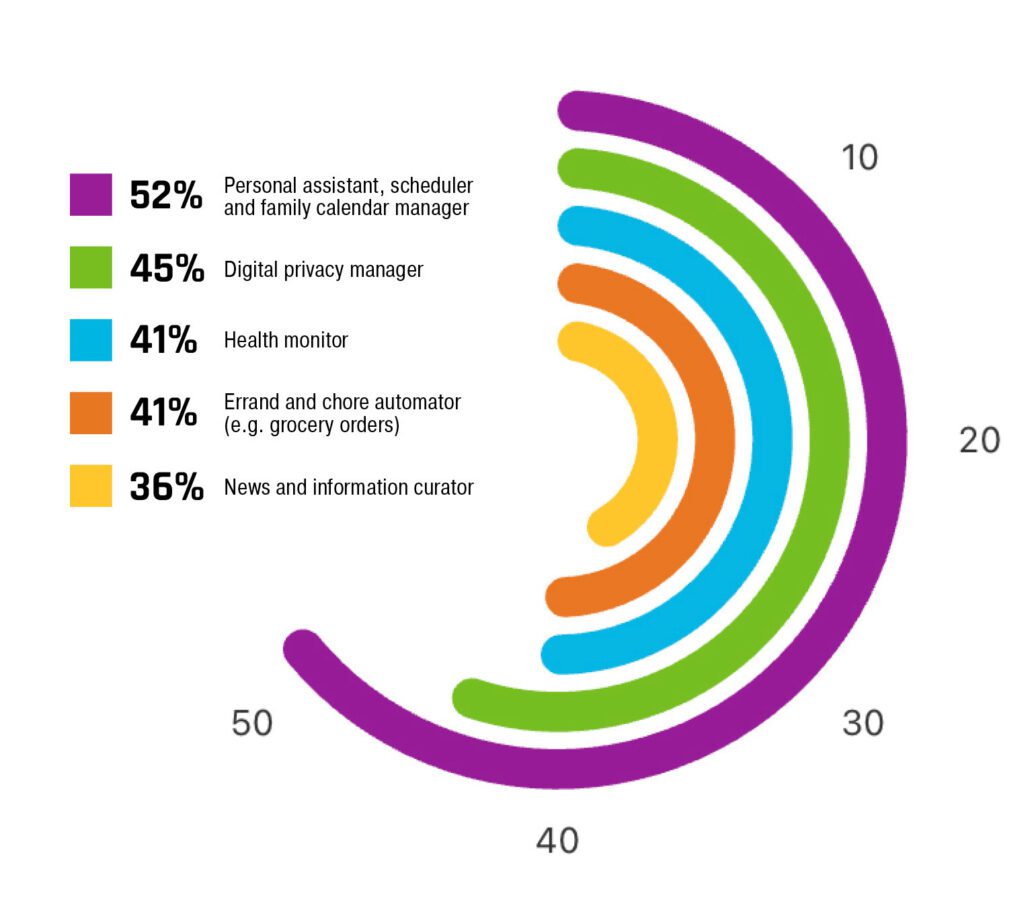November 3, 2025
Summary:
- AI agents, which pursue goals independently rather than wait for feedback or permission, are moving from business use into the consumer market.
- The shift could transform shopping, healthcare, financial services and more.
- A new IEEE survey predicts that in 2026, AI agents such as personal assistants and calendar managers will reach mass or near-mass adoption, while agentic AI tutors for children are less likely to reach such levels.
- But experts warn that the AI’s voracious demand for data poses privacy risks.
A new generation of AI is rapidly moving from hype to reality. It’s called agentic AI, which consists of autonomous AI agents – or systems – that can achieve goals without requiring constant human control.
For now, they’ve been a business-to-business affair. Large organizations use them because they can automate routine tasks. Developers of these agents have focused on business because large organizations typically have lots of data that AI systems can learn from.
But AI agents are expected to impact the consumer market as well. The personal digital assistants on your smartphone might be able to tell you what time a soccer match started if you asked. Agentic systems, which can already use your computer on your behalf if you let them, could look at your bank account, decide how much you can afford to spend, buy the tickets and order you a rideshare car before that match starts, all with a simple prompt.
“The difference from traditional AI is stark,” said IEEE Senior Member Eleanor Watson. “Earlier assistants waited to be asked, responding with answers or, at best, a static recommendation. Agentic systems take initiative, pursuing objectives over time, checking their own work and revising strategies if circumstances change. They don’t just answer a question, they carry out the plan that flows from it.”
A Rise in Consumer AI Agents
Where will consumers encounter agentic AI first? In some cases, they’re already using it, especially at work.
In their personal lives, experts say the first AI agents to hit the mainstream will be personal assistants, family calendar managers and scheduling tools.
In “The Impact of Technology in 2026 and Beyond: an IEEE Global Study,” a recent survey of global technology leaders, 52% of respondents said that personal assistants would reach mass market consumer adoption in 2026. Just under half — 45% — see AI agents working as digital privacy managers in the coming year. At 16% AI agents that could tutor your children were seen as the least likely to reach mass adoption.
What Agentic AI use cases do you see reaching mass or near-mass consumer adoption in 2026?

“The likely trajectory is clear: personal finance, health and wellbeing, travel, logistics and household management are the domains where the consumer experience is set to change most profoundly as agents take on a role closer to delegated staff than digital tools,” Watson said.
“Looking three to five years ahead, this autonomy will become more ambient,” Watson said. “Agents will not sit apart as apps but flow through banks, retailers, insurers and health platforms, negotiating directly with those systems on your behalf.”
How Agentic AI Works
Agentic AI shares many similarities and underlying technologies with the generative AI chatbots that have taken the world by storm. The best way to think of AI agents isn’t as one monolithic system. Rather, they consist of several tools chained together. Some of those tools are mini-chatbots focused on a particular problem. Some are just traditional software that solves problems through programming logic.
A simple AI agent might tackle problems by using several tools or specialized AI systems in a pre-defined order. That process is like an assembly line, one that can buy an airplane ticket for you. One narrow AI checks your budget. Another hunts for flights under that price. A third ranks the hotels nearby. Each tool has its job, and they hand results down the line in a fixed order. It works, but it’s rigid.
Alternatively, some systems feature one “master AI” that has access to several tools at its disposal. It identifies what tasks need to occur, identifies the tools needed to accomplish those tasks and then uses the tools to do so.
You tell it, “I want to go to New York for the weekend, under $800 and close to a museum.” The master AI parses that request, decides which tools it needs — flight search, hotel reviews, maybe even a weather forecast — and then calls them in.
When one tool suggests a cheap red-eye flight, the AI checks your stored preferences, remembers you hate overnight flights and throws it out. If different tools conflict, it weighs the trade-offs like price, distance, rating and picks the best fit. Finally, it explains its reasoning and asks your permission to book the trip.
Privacy Challenges with AI Agents
One of the challenges that the developers of AI agents face is the AI’s need for data. Buying a single airplane ticket would require access to your financial records and your previous travel history. It might also want to know your personal health history, to make restaurant recommendations or make clothing recommendations if you are prone to sunburn, or tell you to stock up on allergy medications if you have allergies.
Given some of the expected use cases in healthcare, education and shopping, some experts have warned that agentic AI could pose a massive risk to personal privacy.
And then there is the matter of trust.
“Semi-autonomous systems can also drift from intended objectives, requiring oversight and regular audits,” Watson said.
But if an agent makes a decision on your behalf, it may be hard to tell why. That’s something that could slow adoption.
“If the systems continue to operate as opaque entities,” said IEEE Member Alendey Severo, “they will struggle to gain stakeholder trust, particularly regarding the management of personal data and decision-making processes.”
Go Deeper: Discover more insights from IEEE’s global survey on the technologies transforming 2026.





 Meaningful Momentum or Running in Place?
Meaningful Momentum or Running in Place? AI Through Our Ages
AI Through Our Ages Liquid Infrastructure: Our Planet's Most Precious Resource
Liquid Infrastructure: Our Planet's Most Precious Resource The Impact of Technology in 2025
The Impact of Technology in 2025 Quantum and AI: Safeguards or Threats to Cybersecurity?
Quantum and AI: Safeguards or Threats to Cybersecurity? Why AI Can't Live Without Us
Why AI Can't Live Without Us Bits, Bytes, Buildings and Bridges: Digital-Driven Infrastructure
Bits, Bytes, Buildings and Bridges: Digital-Driven Infrastructure Impact of Technology in 2024
Impact of Technology in 2024 Emerging AI Cybersecurity Challenges and Solutions
Emerging AI Cybersecurity Challenges and Solutions The Skies are Unlimited
The Skies are Unlimited Smart Cities 2030: How Tech is Reshaping Urbanscapes
Smart Cities 2030: How Tech is Reshaping Urbanscapes Impact of Technology 2023
Impact of Technology 2023 Cybersecurity for Life-Changing Innovations
Cybersecurity for Life-Changing Innovations Smarter Wearables Healthier Life
Smarter Wearables Healthier Life Infrastructure In Motion
Infrastructure In Motion The Impact of Tech in 2022 and Beyond
The Impact of Tech in 2022 and Beyond Cybersecurity, Technology and Protecting Our World
Cybersecurity, Technology and Protecting Our World How Technology Helps us Understand Our Health and Wellness
How Technology Helps us Understand Our Health and Wellness The Resilience of Humanity
The Resilience of Humanity Harnessing and Sustaining our Natural Resources
Harnessing and Sustaining our Natural Resources Creating Healthy Spaces Through Technology
Creating Healthy Spaces Through Technology Exceptional Infrastructure Challenges, Technology and Humanity
Exceptional Infrastructure Challenges, Technology and Humanity The Global Impact of IEEE's 802 Standards
The Global Impact of IEEE's 802 Standards Scenes of our Cyber Lives: The Security Threats and Technology Solutions Protecting Us
Scenes of our Cyber Lives: The Security Threats and Technology Solutions Protecting Us How Millennial Parents are Embracing Health and Wellness Technologies for Their Generation Alpha Kids
How Millennial Parents are Embracing Health and Wellness Technologies for Their Generation Alpha Kids Space Exploration, Technology and Our Lives
Space Exploration, Technology and Our Lives Global Innovation and the Environment
Global Innovation and the Environment How Technology, Privacy and Security are Changing Each Other (And Us)
How Technology, Privacy and Security are Changing Each Other (And Us) Find us in booth 31506, LVCC South Hall 3 and experience the Technology Moon Walk
Find us in booth 31506, LVCC South Hall 3 and experience the Technology Moon Walk Virtual and Mixed Reality
Virtual and Mixed Reality How Robots are Improving our Health
How Robots are Improving our Health IEEE Experts and the Robots They are Teaching
IEEE Experts and the Robots They are Teaching See how millennial parents around the world see AI impacting the lives of their tech-infused offspring
See how millennial parents around the world see AI impacting the lives of their tech-infused offspring Take the journey from farm to table and learn how IoT will help us reach the rising demand for food production
Take the journey from farm to table and learn how IoT will help us reach the rising demand for food production Watch technical experts discuss the latest cyber threats
Watch technical experts discuss the latest cyber threats Explore how researchers, teachers, explorers, healthcare and medical professionals use immersive technologies
Explore how researchers, teachers, explorers, healthcare and medical professionals use immersive technologies Follow the timeline to see how Generation AI will be impacted by technology
Follow the timeline to see how Generation AI will be impacted by technology Learn how your IoT data can be used by experiencing a day in a connected life
Learn how your IoT data can be used by experiencing a day in a connected life Listen to technical experts discuss the biggest security threats today
Listen to technical experts discuss the biggest security threats today See how tech has influenced and evolved with the Games
See how tech has influenced and evolved with the Games Enter our virtual home to explore the IoT (Internet of Things) technologies
Enter our virtual home to explore the IoT (Internet of Things) technologies Explore an interactive map showcasing exciting innovations in robotics
Explore an interactive map showcasing exciting innovations in robotics Interactively explore A.I. in recent Hollywood movies
Interactively explore A.I. in recent Hollywood movies Get immersed in technologies that will improve patients' lives
Get immersed in technologies that will improve patients' lives